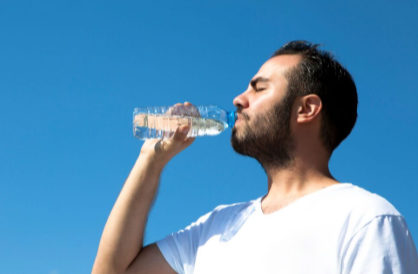The Role of Hydration in Maintaining Overall Health

Hydration is essential for maintaining overall health, influencing various bodily functions, including physical performance and cognitive abilities. Inadequate fluid intake can lead to fatigue, decreased focus, and even mood disturbances. Understanding the multifaceted role of hydration is crucial for individuals seeking to enhance their well-being. The implications of dehydration extend beyond mere thirst, prompting a closer examination of hydration practices and their impact on daily life. What factors should one consider to ensure optimal hydration?
The Importance of Hydration for Physical Performance
Although many individuals recognize the importance of hydration, its critical role in enhancing physical performance is often underestimated. Proper hydration strategies are essential for athletes and active individuals, as they not only support endurance but also optimize strength and agility.
When the body is well-hydrated, it maintains an effective electrolyte balance, which is vital for nerve function and muscle contraction. Dehydration can lead to fatigue, decreased coordination, and impaired recovery. Research indicates that even a modest drop in hydration levels can hinder performance significantly.
Therefore, individuals seeking to maximize their physical potential must prioritize hydration as a fundamental component of their training regimen. Embracing effective hydration strategies not only fosters physical freedom but also empowers one to achieve their performance goals.
How Hydration Affects Cognitive Function
Research indicates that adequate hydration plays a crucial role in maintaining mental clarity and cognitive performance.
Studies show that even mild dehydration can impair memory retention and diminish focus, which are essential for optimal cognitive function.
Thus, ensuring proper fluid intake is vital for enhancing overall cognitive abilities and performance.
Dehydration and Mental Clarity
How does dehydration impact mental clarity? The dehydration effects on cognitive function are significant, as studies indicate that even mild dehydration can impair attention, memory, and overall mental performance.
When the body lacks adequate fluids, the brain’s ability to process information diminishes, leading to confusion and decreased focus. This decline in mental clarity can hinder one’s capacity to make decisions and solve problems effectively, ultimately affecting daily life and productivity.
Implementing hydration strategies, such as regular water intake throughout the day and consuming hydrating foods, can counteract these adverse effects.
To maintain optimal mental clarity, individuals must prioritize hydration, ensuring their cognitive functions remain sharp and responsive. Freedom in thought and action begins with proper hydration.
Hydration and Memory Retention
What role does hydration play in memory retention? Adequate hydration is crucial for cognitive function, as it significantly influences memory enhancement.
Research indicates that even mild dehydration can impair memory recall and cognitive performance. Maintaining optimal fluid balance through effective hydration strategies can lead to improved focus and mental clarity.
Hydration supports brain health by facilitating nutrient transport and waste removal, essential for cognitive enhancement. Furthermore, studies reveal that individuals who practice consistent hydration experience better retention of information.
To optimize memory function, it is vital to prioritize hydration throughout the day. By incorporating structured hydration strategies, individuals can enhance their cognitive capabilities and promote overall mental well-being, empowering them to achieve greater freedom in their daily pursuits.
Performance and Focus Enhancement
Hydration significantly impacts cognitive function, particularly in enhancing performance and focus. Studies have shown that even mild dehydration can lead to diminished concentration, impaired decision-making, and reduced alertness.
Implementing effective hydration strategies—such as regular water intake and consuming hydrating foods—can significantly bolster cognitive capabilities. Furthermore, pairing hydration with focus techniques, like mindfulness or scheduled breaks, can optimize mental performance.
Individuals seeking to enhance their cognitive function should prioritize adequate hydration as a foundational element. By embracing these practices, they can achieve greater clarity and improved focus, ultimately fostering an environment where mental freedom and productivity thrive.
Thus, understanding the relationship between hydration and cognitive performance is crucial for anyone aiming to enhance their daily efficiency and mental acuity.
The Connection Between Hydration and Mood Regulation
Research indicates a significant link between hydration and emotional stability, with adequate water intake contributing to better mood regulation.
Dehydration can lead to increased feelings of anxiety and irritability, underscoring the importance of maintaining proper hydration levels.
Experts recommend specific water intake guidelines to support both physical and mental well-being, highlighting hydration as a crucial element in mood management.
Hydration and Emotional Stability
Although often overlooked, the relationship between fluid intake and emotional well-being plays a crucial role in mood regulation. Adequate hydration supports cognitive function, which directly influences emotional resilience.
Studies indicate that even mild dehydration can lead to increased feelings of anxiety and irritability, underscoring the importance of hydration strategies. Implementing effective hydration practices, such as setting reminders to drink water or integrating hydrating foods into meals, can enhance mood stability.
By prioritizing hydration, individuals empower themselves to manage emotional fluctuations more effectively. This proactive approach not only fosters a sense of freedom but also promotes overall mental health.
Ultimately, understanding the connection between hydration and emotional stability is essential for cultivating a balanced, fulfilling life.
Dehydration’s Impact on Mood
The effects of dehydration on mood can be profound, influencing emotional stability and cognitive performance. Research indicates that even mild dehydration can lead to increased feelings of anxiety, fatigue, and irritability.
This connection stems from the brain’s sensitivity to hydration levels; a lack of fluids can impair neurotransmitter function, which is crucial for mood regulation.
Implementing effective hydration strategies, such as regular water intake and consuming hydrating foods, can mitigate these dehydration effects. Maintaining optimal hydration not only enhances overall well-being but also fosters emotional resilience.
In a world that often prioritizes productivity, recognizing the importance of hydration in sustaining a balanced mood can empower individuals to take control of their emotional health and improve their quality of life.
Water Intake Recommendations
To maintain optimal mood regulation, adhering to recommended water intake levels is essential, as proper hydration directly influences cognitive and emotional functions.
Numerous hydration myths suggest that only eight glasses of water are necessary, yet individual needs vary based on factors like age, activity level, and climate.
Research indicates that adequate hydration benefits include improved concentration, reduced fatigue, and enhanced mood stability. The body’s ability to manage stress and anxiety is also linked to sufficient water intake.
By recognizing the importance of personalized hydration recommendations, individuals can empower themselves to make informed choices that support their mental health.
Embracing these insights can liberate individuals from misconceptions, allowing them to fully experience the positive effects of proper hydration on overall well-being.
Signs and Symptoms of Dehydration
Dehydration can manifest through a variety of signs and symptoms that signal the body’s need for increased fluid intake. Individuals may experience persistent thirst signals, dry mouth, fatigue, and dizziness, which indicate that fluid balance is compromised.
Chronic dehydration can lead to dehydration consequences such as impaired kidney function and increased risk of electrolyte imbalance. These symptoms are often misunderstood due to common hydration myths that trivialize the importance of adequate water consumption.
Awareness of these signs is crucial for maintaining optimal health. By recognizing the early indicators of dehydration, individuals can take proactive steps to ensure proper hydration, thereby supporting overall well-being and preventing potential complications associated with inadequate fluid intake.
The Role of Hydration in Digestion and Metabolism
While many may underestimate the importance of hydration, it plays a crucial role in digestion and metabolism. Adequate water intake is essential for the proper function of digestive enzymes, which break down food and facilitate nutrient absorption.
Without sufficient hydration, these enzymes can become less effective, leading to digestive issues and nutrient deficiencies. Moreover, hydration benefits extend to metabolic processes, as water is involved in energy production and the transportation of nutrients throughout the body.
A well-hydrated individual may experience improved metabolic rates, contributing to overall health and vitality. Emphasizing the significance of hydration can empower individuals to make informed choices, promoting optimal digestion and enhancing metabolic efficiency for a liberated and vibrant life.
Hydration and Skin Health
Maintaining adequate hydration extends beyond digestive health, significantly impacting skin health as well. Proper hydration plays a crucial role in enhancing skin elasticity, which is vital for a youthful appearance.
When the body is sufficiently hydrated, skin cells retain moisture, resulting in a plump and resilient complexion. Conversely, dehydration can lead to dry, flaky skin and exacerbate the appearance of fine lines.
Numerous studies highlight hydration benefits, showing that drinking an adequate amount of water can improve overall skin texture and tone. Individuals seeking to maintain vibrant, healthy skin should prioritize hydration, recognizing it as an essential component of their wellness routine.
Embracing this knowledge empowers them to achieve their skin health goals with confidence and freedom.
Recommended Daily Water Intake: How Much Do You Really Need?
How much water should one actually consume daily to optimize health? While common hydration myths suggest a rigid eight glasses, individual needs vary significantly based on factors like activity level, climate, and diet.
The National Academies of Sciences recommends approximately 3.7 liters for men and 2.7 liters for women, encompassing all hydration sources, including food and beverages.
It is essential to recognize that not all fluid intake must come from water; fruits, vegetables, and other liquids contribute to overall hydration.
Thus, listening to the body’s signals and adjusting intake accordingly can foster better health. Ultimately, understanding personal hydration needs promotes autonomy in maintaining well-being, encouraging individuals to break free from generalized guidelines and embrace a tailored approach to hydration.
Tips for Staying Hydrated Throughout the Day
Understanding personal hydration needs is just the first step; implementing effective strategies to stay hydrated throughout the day is equally important. Developing consistent hydration habits can transform daily wellness.
One practical approach is to incorporate water-rich foods such as cucumbers, oranges, and strawberries into meals and snacks. These foods not only provide hydration but also essential nutrients.
Additionally, setting reminders to drink water at regular intervals can foster a proactive mindset. Carrying a reusable water bottle encourages spontaneous sipping throughout the day.
It is also beneficial to create a hydration schedule, aligning water intake with daily activities. By integrating these strategies, individuals can enhance their overall health and enjoy the freedom that comes with optimal hydration.
The Impact of Different Beverages on Hydration Levels
What beverages are most effective for hydration? Research indicates that water remains the gold standard for hydration.
However, herbal teas can also significantly contribute to fluid intake without added sugars.
While coffee consumption has been historically linked to dehydration, recent studies suggest it can still aid hydration due to its high water content.
Sports beverages can replenish electrolyte balance after intense exercise, but they often contain high sugar levels, leading to hydration myths about their efficacy.
Sugary drinks, on the other hand, may dehydrate rather than hydrate, making them less beneficial.
For optimal hydration, individuals should prioritize water and herbal options, reserving sugary and caffeinated beverages for moderation, thus ensuring both freedom of choice and body wellness.
Conclusion
In conclusion, proper hydration is essential for maintaining physical performance, cognitive function, and mood stability. As the adage goes, “You are what you drink,” emphasizing the profound impact of hydration on overall health. By recognizing the signs of dehydration and prioritizing adequate fluid intake, individuals can enhance their well-being and prevent health complications. Implementing consistent hydration practices not only supports bodily functions but also fosters a healthier lifestyle, ultimately leading to improved quality of life.



